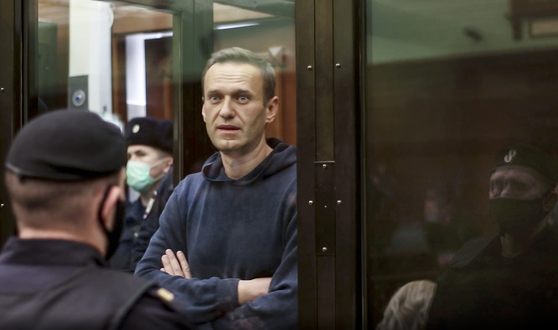![On the 2nd (local time), a Russian court sentenced Alexey Navalni to three years and six months in prison. [AP=연합뉴스]](https://i0.wp.com/pds.joins.com/news/component/htmlphoto_mmdata/202102/03/3fc21567-3e99-43f6-bd80-3ea379d6f461.jpg?w=560&ssl=1)
On the 2nd (local time), a Russian court sentenced Alexey Navalni to three years and six months in prison. [AP=연합뉴스]
Alexey Navalni, a political opponent and opposition activist of Russian President Vladimir Putin, was sentenced to three years and six months in prison. After being terrorized by poison, he recovered and returned to his country after his lifetime, and he was immediately arrested by Russian authorities. Western countries, such as the United States and Europe, immediately criticized them all at once, saying that they “betrayed the rule of law and human rights.”
Navalni sentenced to prison for breach of possession
Criticism of Russia at the same time in Western society such as the US, Germany and France
“Do not interfere with internal affairs, pay attention to your own affairs”
On the 2nd (local time), the Moscow Sinonovsky court ruled that the probation for Navalni be converted to imprisonment. Navalni was sentenced to three years and six months, but he had to serve two years and six months, excluding one year spent under house arrest.
On this day, a Russian court ruled that Navalni had not fulfilled the obligations arising from the probation sentenced earlier. In 2014, Navalni was sentenced to three years and six months in prison and five years probation on charges of receiving money and other goods from the Russian branch of a French cosmetics company.
The probation, which was originally scheduled to end in December 2019, was postponed until the end of last year. The Russian correctional authorities filed a lawsuit against the court to cancel the sentence of probation and convert the sentence to imprisonment, claiming that Navalni had not fulfilled the conditions of probation, such as the appearance of an investigation agency.
Navalni’s lawyer rebutted, saying, “Since August of last year, Navalni was addicted to poison and received treatment in Germany, and he continued rehabilitation after discharge.”
Navalni, who has consistently accused Russian government officials of corruption such as Putin, collapsed while showing signs of poisoning poisoning while traveling from Tomsk, Siberia to Moscow in August last year. Afterwards, he was transferred to Germany for treatment, and German experts announced that Navalni had been addicted to the poison of the military nerve agent’Nobichok’ developed in the former Soviet Union.
Navalni, who appeared in court, aimed directly at President Putin. “I was arrested because of Putin’s fear and hatred,” he said. “It seems that Putin is very unpleasant that I survived the poisoning attempt.” He added, “Putin pretends to be a very big politician and world leader, but eventually he will remain in history as a poisoner.”
![Alexey Navalni's wife Julia appeared in court on the 2nd (local time) to observe the Navalni trial. [AP=연합뉴스]](https://i0.wp.com/pds.joins.com/news/component/htmlphoto_mmdata/202102/03/ae4578f9-6eed-470e-974f-651f7d73cfd2.jpg?w=560&ssl=1)
Alexey Navalni’s wife Julia appeared in court on the 2nd (local time) to observe the Navalni trial. [AP=연합뉴스]
“The purpose of this judicial process is to scare millions of people,” Navalni said to his supporters. “We can’t imprison everyone. Don’t be afraid.” After the sentence was handed down, he made a heart shape with both hands to his wife Julia and said, “It will all go well.”

Immediately after Alexei Navalni was sentenced to prison sentence, he drew a heart shape with both hands toward his wife, Julia. On this day, Navalni criticized Putin that he will remain in history as a poisoner. [AFP=연합뉴스]
◇1000 protesters arrested
According to the Associated Press, protests demanding the release of Navalni continued until 1 am in Moscow and St. Petersburg on the day of the court ruling. OVD-Info, which monitors the arrests of political prisoners, said about 1,000 protesters were arrested across Russia. In the protests on the 23rd and 31st of last month, more than 9,000 protesters were arrested by the Russian police.
![OVD Info said on the 2nd (local time) that about 1,000 protesters who participated in a protest demanding the release of Alexey Navalni were arrested by Russian police. [AFP=연합뉴스]](https://i0.wp.com/pds.joins.com/news/component/htmlphoto_mmdata/202102/03/202421a1-2221-4106-9780-4afa5b031ef2.jpg?w=560&ssl=1)
OVD Info said on the 2nd (local time) that about 1,000 protesters who participated in a protest demanding the release of Alexey Navalni were arrested by Russian police. [AFP=연합뉴스]
The Navalni support group said through social media immediately after the protest that “we will never tolerate a government that kills and imprisons opposing people,” and “we will definitely return to the city streets.”
◇Western “Abandon the rule of law and human rights”
When the news of Navalni’s sentence was delivered, Western countries such as the United States and Europe criticized Russia and demanded the release of Navalni.
The US State Department issued a statement in the name of Secretary Tony Blincoln, saying, “The United States is deeply concerned about the decision of the Russian authorities to imprison Navalni,” and said, “Like all Russians, Navalni should enjoy the rights guaranteed by the Constitution.” He added, “I once again demand that the hundreds of Russian citizens and Navalni who have been unfairly detained in recent weeks be released immediately and unconditionally.”
Secretary Blincoln warned of possible sanctions by saying, “We will work closely with our allies and partners to hold Russia accountable for not defending the rights of its own citizens.”
French President Emmanuel Macron also said, “This ruling against Navalni is unacceptable.” “Human rights and freedoms are not subject to compromise. We demand immediate release.”
Prime Minister Angela Merkel also urged, in a statement released on a tweet by a spokesman, “The ruling against Navalni is far from any kind of rule of law.”
In response, a spokesman for the Ministry of Foreign Affairs of Russia said, “There is no need to intervene in the internal affairs of the sovereign state.
Reporter Seok Kyung-min [email protected]
